We picked the best cheap MIDI keyboards to help you get the most out of your software-based production setup without spending much money.
A MIDI keyboard is an essential component of the music production setup for artists looking to perform and record melodies and chord progressions instead of sequencing them manually.
Fortunately, a good MIDI keyboard doesn’t have to break the bank. We handpicked ten affordable keyboard controllers that should comfortably fit into the budget of a bedroom producer.
We focused on budget keyboards that check all the boxes regarding build quality and essential features for music production. The list includes small and portable keyboards for beginners, as well as large MIDI keyboards for experienced piano players.
Which MIDI keyboard is best for you?
Your choice of MIDI keyboard may come down to your skill level, the style of music you’re producing, or the particular instruments you plan on using it for.
Your music style determines your MIDI keyboard needs
For example, electronic musicians will probably do just fine with a small keyboard with 25 or 32 keys. However, they can greatly benefit from a MIDI controller/keyboard hybrid equipped with knobs and sliders to control various VST plugin parameters in the DAW via MIDI.
On the other hand, cinematic composers will need a larger keyboard that covers more octaves and higher quality keys that enables more expressive playing. They don’t need many knobs, though, and will probably do fine with a pitch bend wheel and a modulation wheel as the only modulation sources.
In any case, there are some aspects of the keyboard design you should keep in mind when considering your options.
Hammer-action Vs. synth-action MIDI keyboards
You’ll find keyboards with unweighted, semi-weighted, and hammer-action weighted keys available on the market. If you’re wondering why you would select one type over another, the answer is simple: velocity.
It’s far easier to play dynamically using a range of MIDI input velocities on fully weighted keys compared to any other type of controller.
That said, if you aim to emulate the feel of early 1980s analog synths and drum machines, then velocity goes out of the window. This is because most of these instruments simply didn’t have the feature. In this case, you’ll get great results with unweighted or synth-action keys.
Why MIDI keyboard size matters
You may have limited space, so a 37-key controller is usually the first choice for most desktop setups. With larger 61 and 88-key controllers, you might consider a stand if the room you’re working in will accommodate it.
If you’re a pianist looking for a keyboard to keep your chops up, a weighted 88-key controller should be your minimum requirement. This is because even semi-weighted keys don’t provide the same feel as a real piano.
The other reason for using a larger keyboard is that some sample-based software instruments rely on extended keybeds to access all the articulations or samples in a particular patch. In short, you’ll get far better results with your plug-ins from Spectrasonics, XLN Audio, and Vienna Symphonic with a larger keyboard.
On the other end of the spectrum, small and portable 25-key MIDI keyboards are perfect for music producers who often create music outside their studios. If you collaborate with other artists or like traveling, having a MIDI keyboard that fits in a backpack is a major plus.
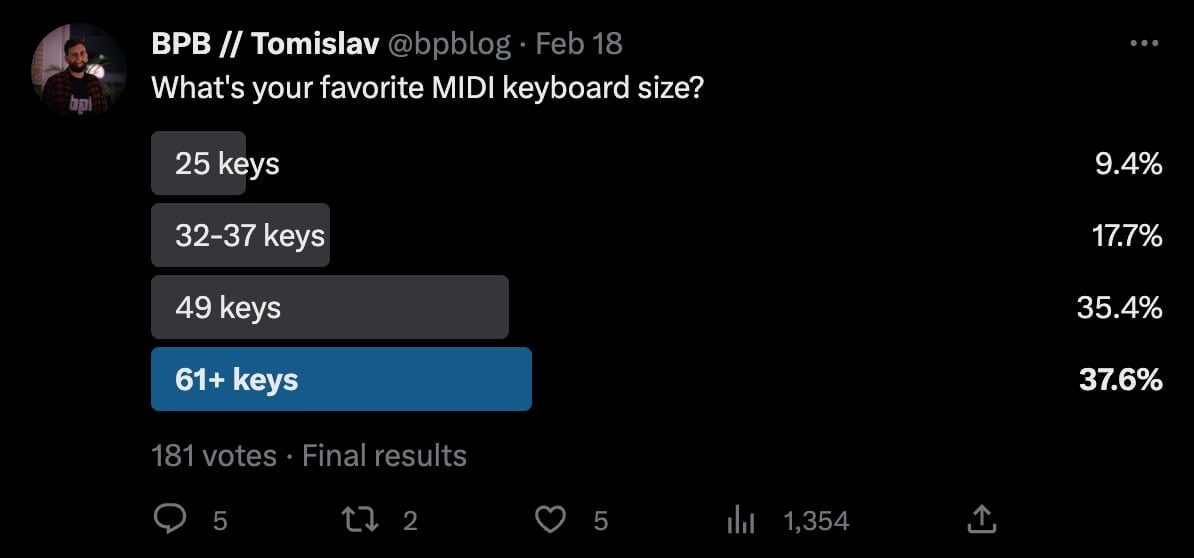
Our little poll revealed that most BPB readers prefer larger MIDI keyboards over small and portable ones.
After polling BPB readers on their preferred MIDI keyboard size (get more details here), the results indicated that most voters (37.6%) preferred 61 keys or more. Following closely behind were 49-key keyboards, with 35.4% of votes. Small 25-key keyboards were the least popular option, with only 9.4% of the votes.
With those results in mind, our article features a wider range of keyboards with 49 or more keys. However, we also include some smaller keyboards because of their affordability and portability.
MIDI knobs, pads, and sliders
MIDI keyboards and MIDI controllers are essentially two different things, but most MIDI keyboards are hybrid designs with at least a few MIDI knobs, sliders, or trigger pads.
These controls will make it easier to adjust the parameters of virtual instruments. You can also use them to adjust your EQs and compressors when mixing.
Some of us prefer continuous rotary encoders, also known as knobs or pots, for CC automation. Either way, the resolution of the fader or encoder is another reason you might get more accurate and more natural-sounding automation contours.
Maybe you’re a button-basher looking to extend the pad bank you already have with your Ableton Push controller, or you need to automate the faders, sends, and other plug-in parameters inside your DAW.
Like keys, some MIDI pads offer a higher degree of velocity sensitivity than others. Obviously, due to the nature of this MPC-style MIDI input, build quality is also an important factor to consider.
Are MIDI keyboards expensive?
While high-end MIDI keyboards can be costly, an expensive keyboard is not a requirement for making music. For both beginners and experienced music producers, most inexpensive MIDI keyboards in the sub-$100 price range are more than adequate.
Pricier keyboards may offer a broader note range, more knobs and sliders, higher-quality keys, and better overall build quality, but lower-priced MIDI keyboards often have their own advantages. For example, they tend to be more lightweight and portable, making them ideal for musicians who travel frequently.
Cheaper keyboards are also obviously more budget-friendly, saving money you can invest in other parts of your music production setup, like headphones and studio monitors.
Best Cheap MIDI Keyboards
Below, you will find our selection of the best budget-friendly MIDI keyboards, listed by size, from smallest to largest. It’s worth noting that larger keyboards aren’t necessarily more expensive.
The best cheap MIDI keyboards in 2023 are:
- AKAI MPK Mini MK3
- Arturia MiniLab 3
- NI Komplete Kontrol M32
- Arturia Keystep 37
- Novation FLkey 37
- M-Audio Keystation 49 MK3
- Novation Launchkey 49 MK3
- Nectar Impact LX49+
- Arturia KeyLab Essential 61
- M-Audio Hammer 88
Let’s take a closer look at the listed MIDI keyboards.
AKAI MPK Mini MK3
If you require a portable MIDI keyboard or have limited desktop space, the AKAI MPK Mini mkIII is an excellent choice in the budget range. It is the best-selling MIDI keyboard for a good reason.
Although it only has 25 mini synth-action keys, AKAI MPK Mini MK3 compensates for this by including just the right amount of knobs and additional features to help beginners get started with music production.
It is a well-built MIDI keyboard for the price, and it’s an excellent choice for producers who are building their first music studio. The 8 pads are velocity-sensitive, the 8 knobs are continuous, and the keyboard includes a pitch/mod joystick for additional expressive control.
AKAI MPK Mini MK3 is lightweight and compact, so it’s easy to carry around in a small bag or a backpack.
Arturia MiniLab 3
Arturia MiniLab 3 is another excellent choice if you’re looking for a portable and cheap MIDI keyboard. It has 25 mini keys, 8 velocity-sensitive pads, 8 knobs, 4 sliders, and a pair of touch sensors for pitch and modulation.
The build quality is better than most MIDI keyboards from other manufacturers in this price range. Weighing around 1.5 kg, the keyboard is surprisingly hefty and sturdy enough to endure countless commutes in a backpack.
The keys feel very responsive, although some users might find them too sensitive. The pads are slightly stiff, but they respond well to velocity and seem durable.
The knobs and sliders are decent, and the touch sensors work fine, as long as you don’t mind the lack of physical pitch and modulation wheels.
NI Komplete Kontrol M32
NI Komplete Kontrol M32 provides an affordable option for controlling your Native Instruments software plug-ins. Even if you have not used any NI products previously, the keyboard includes many virtual instruments and comes bundled with Ableton Live Lite, making it an excellent starter pack.
Although the interface is primarily designed for NI software, the 8 touch-sensitive knobs can be assigned to plug-ins in any DAW environment. With its surprisingly responsive micro keys and touch strips for pitch shift and modulation, this well-designed controller offers a lot of value for its price.
NI Komplete Kontrol M32 boasts 32 keys, which not only feels less cramped but also more playable compared to the 25-key keyboards we previously mentioned. Despite its wider key range, this keyboard remains highly portable, making it an ideal choice for producers who value both versatility and mobility.
Arturia Keystep 37
If you’re seeking a fresh approach to working with MIDI in your digital audio workstation or looking to sequence hardware instruments in your setup, the Arturia Keystep 37 keyboard is an excellent option to explore.
Despite its unassuming appearance, Keystep 37’s built-in sequencer and arpeggiator offer robust creative capabilities that can inspire your music-making.
Moreover, Keystep’s versatility goes beyond the software realm. It allows you to send MIDI, Sync, and CV signals to external devices, expanding the possibilities of your setup considerably.
If you are utilizing a combination of virtual and hardware synthesizers, the Keystep 37 can be a fantastic budget-friendly MIDI keyboard to complement your setup.
Novation FLkey 37
Novation FLkey 37 is the best portable MIDI keyboard for FL Studio users. It offers seamless FL Studio integration and comes with a free copy of FL Studio Producer Edition.
If you’re an FL Studio looking for a cheap and compact MIDI keyboard, the Novation FLkey 37 is a no-brainer. You get 37 velocity-sensitive keys, sixteen RGB pads, eight knobs, and direct control over various FL Studio features.
Another useful feature is the built-in step sequencer, which is useful for building simple sequences and ideas before transferring them to your DAW.
M-Audio Keystation 49 MK3
M-Audio Keystation 49 MK3 is one of the cheapest 49-key MIDI keyboards you can add to your setup. Despite its low price, the Keystation 49 is a well-made unit that should stand the test of time.
Despite being a decade old, my trusty Keystation keyboard from 2011 is still going strong without any issues. Nowadays, I use it primarily as a backup keyboard for my main music production setup.
The new MK3 model bears many similarities to its predecessor, except for a revamped design and the addition of an assignable fader. While its modulation capabilities are limited, the 49-key range is ideal for two-handed play and provides excellent versatility for various music production tasks.
Novation Launchkey 49 MK3
Novation Launchkey 49 MK3 is our top pick for a budget-friendly MIDI keyboard with 49 keys.
This affordable MIDI keyboard is not only well-built and well-designed but also offers a surprisingly wide range of modulation sources. With eight knobs, nine sliders, sixteen high-quality pads, and standard pitch and modulation wheels, the Launchkey 49 provides all the essential parameters for controlling your favorite VST plugins.
We tested the Launchkey 49 with several popular DAWs, including Ableton Live, FL Studio, Cubase, and Studio One, and found that it performed exceptionally well with all of them.
Overall, the Novation Launchkey 49 MK3 is an excellent option for musicians seeking a reliable and versatile MIDI keyboard that won’t break the bank.
Nectar Impact LX49+
Nectar Impact LX49+ is a highly affordable 49-key MIDI keyboard with excellent DAW integration.
One of the main benefits of using Impact LX49+ is that it comes with mappings for all major DAW platforms. This immediately saves you plenty of configuration time.
Its 49-key synth-action keybed with 9 faders, 8 pads, 8 rotaries, and transport controls gives you all you could want in a controller this size. The keys are fine but nothing special. On the other hand, the MIDI pads feel great, and you’ll love using Nectar Impact LX49+ for playing virtual drums.
In addition, all the default controller assignments are clearly labeled on each knob and fader. So all you need to do is hook it up via USB, and you’re ready to get busy.
Arturia KeyLab Essential 61
Arturia KeyLab Essential 61 is our favorite affordable 61-key MIDI keyboard. It provides all the essential MIDI keyboard features in a well-built, beautifully designed package without breaking the bank.
We have to highlight Arturia’s excellent design work. KeyLab Essential 61 feels sturdy and built like a tank, which is something we didn’t expect for the price.
We reviewed the KeyLab 49 and were similarly impressed by its build quality.
The keyboard features a typical velocity-sensitive synth keybed. It performs well and is suitable for playing virtual synthesizers and a wide range of sample libraries.
In addition, the pots and faders are exceptionally well-made, with a good amount of weight and smooth action. This is surprising, given the budget-friendly price of the MIDI keyboard.
If you’re using Arturia’s software, you’ll find the clickable encoder particularly useful. It allows you to browse through presets quickly and efficiently.
M-Audio Hammer 88
The price gap between semi-weighted and fully-weighted keyboards is rather large. To make it worse, budget controllers like the M-Audio Hammer 88 don’t have any knobs, pads, or transport controls to increase their versatility.
However, if you can’t do without weighted keys, M-Audio Hammer 88 is one of the most affordable solutions. The playing experience is vastly improved, so many would argue that it’s money well spent.
What is your favorite cheap MIDI keyboard?
Now that you’ve learned more about the best affordable MIDI keyboards, we’d love to hear your thoughts. What MIDI keyboard do you own, and which would you recommend to other music producers?
What is your favorite budget MIDI keyboard from this list? Share your thoughts in the comments section below.
Some parts of this article were written by our contributor Stefan Wyeth.


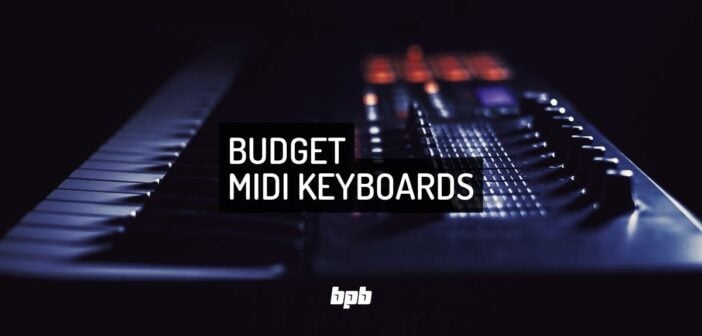

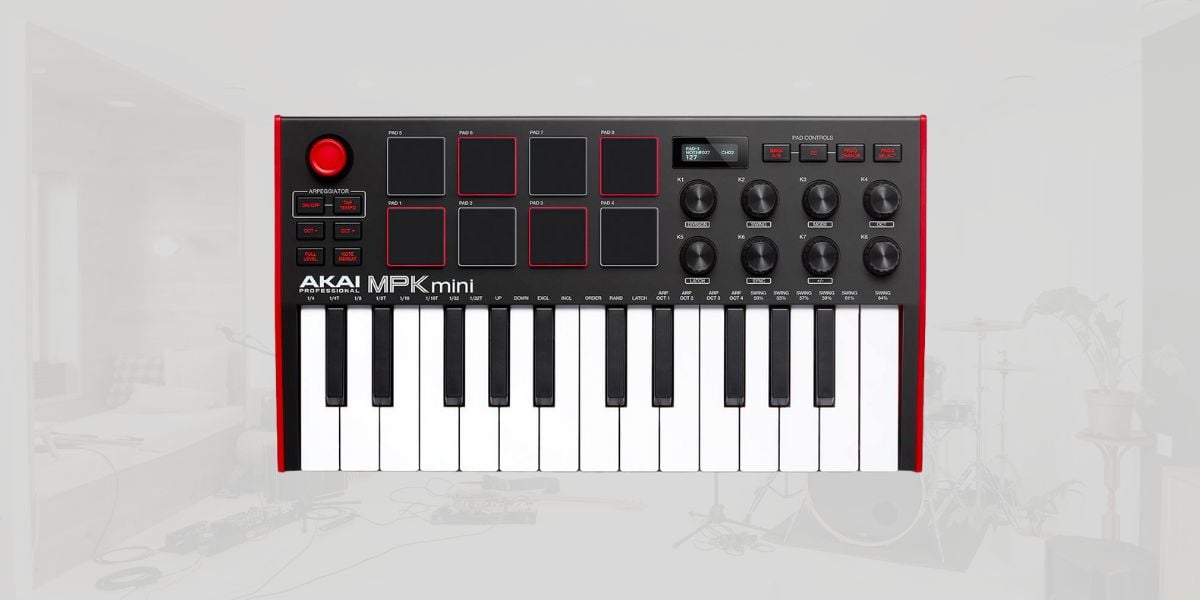
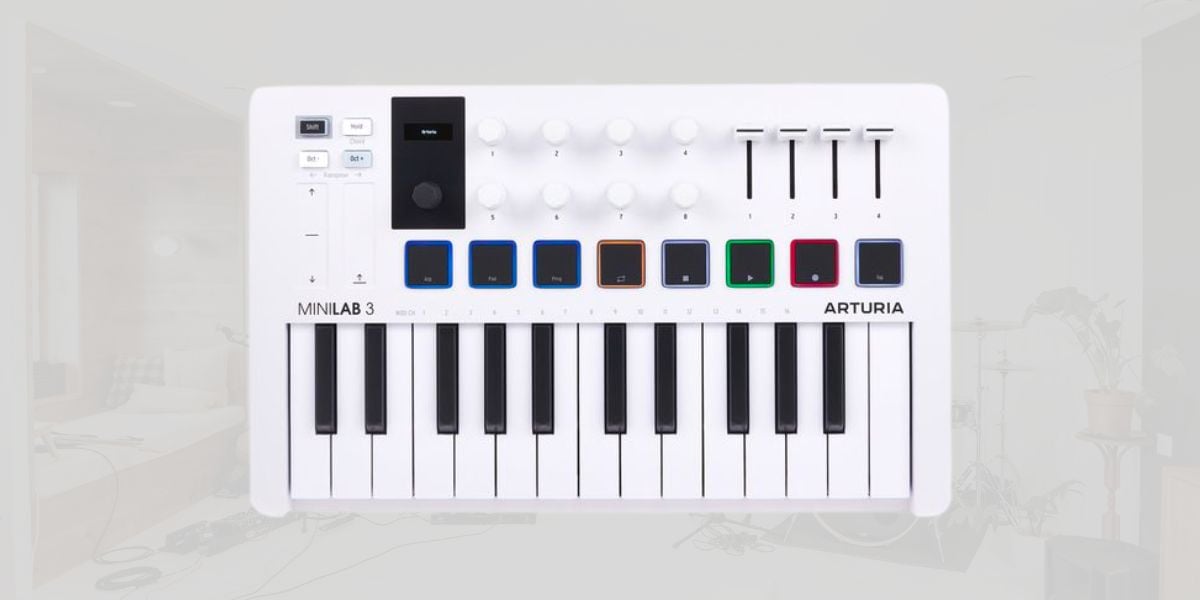
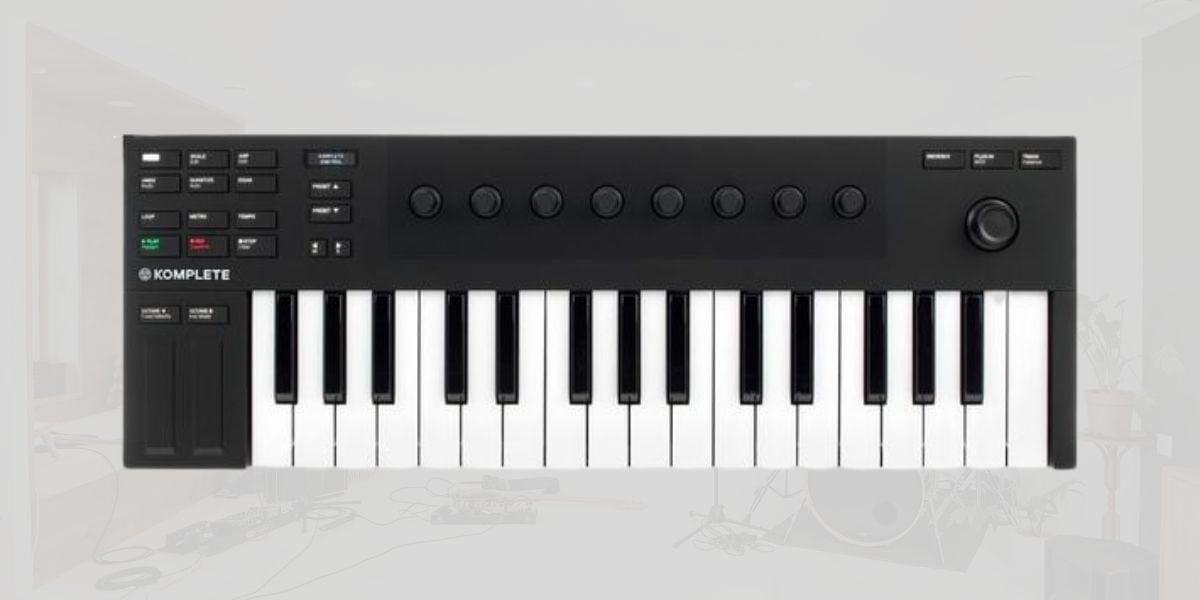

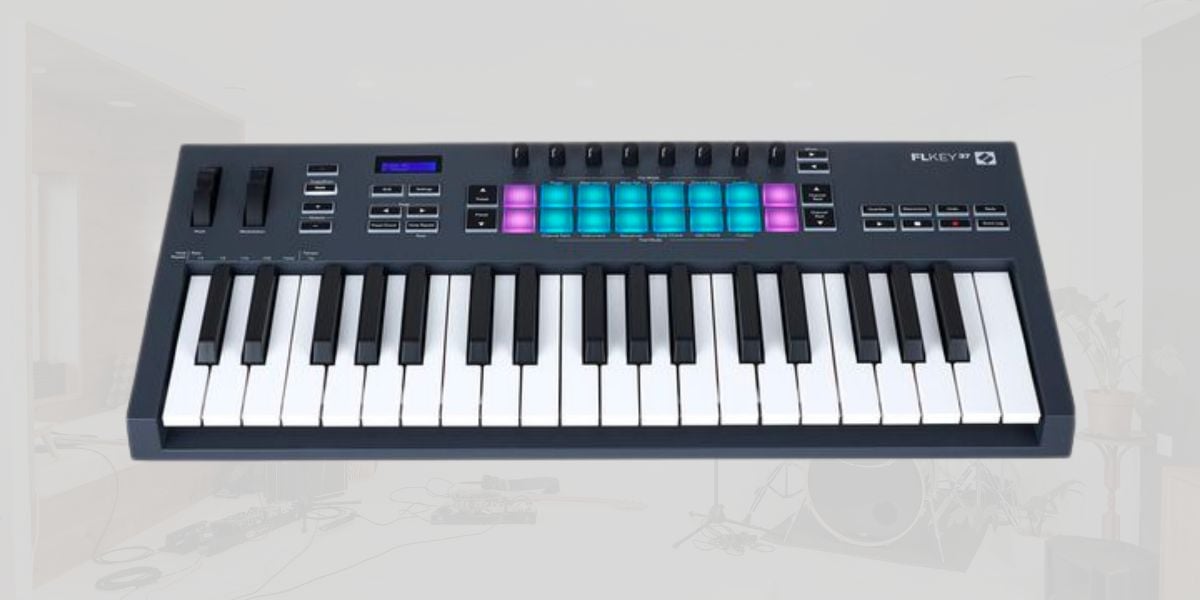
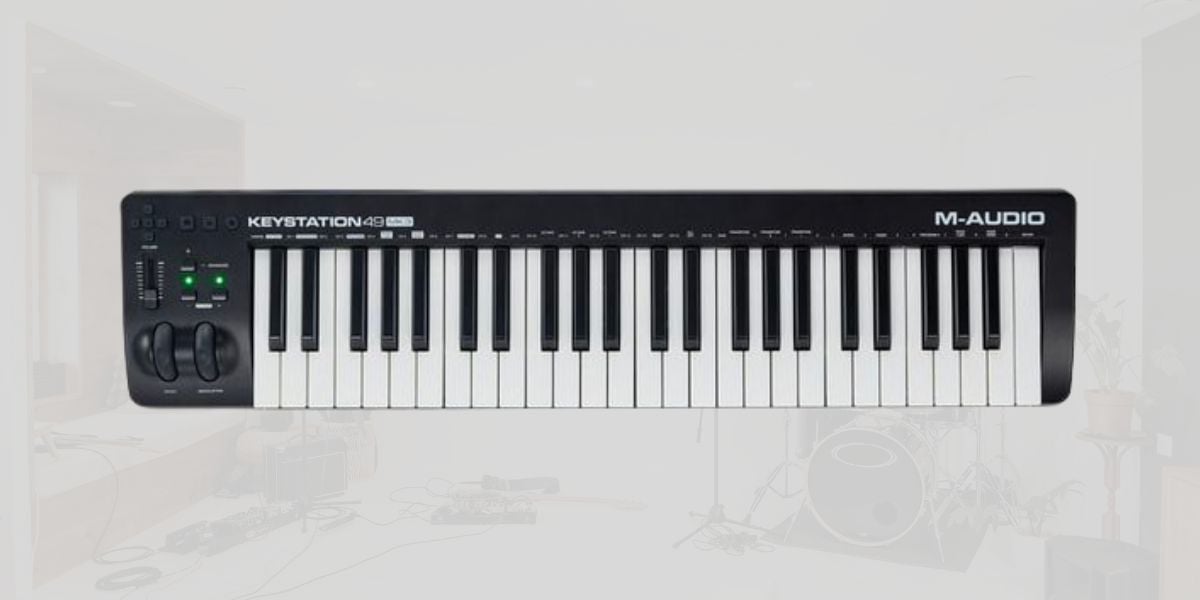
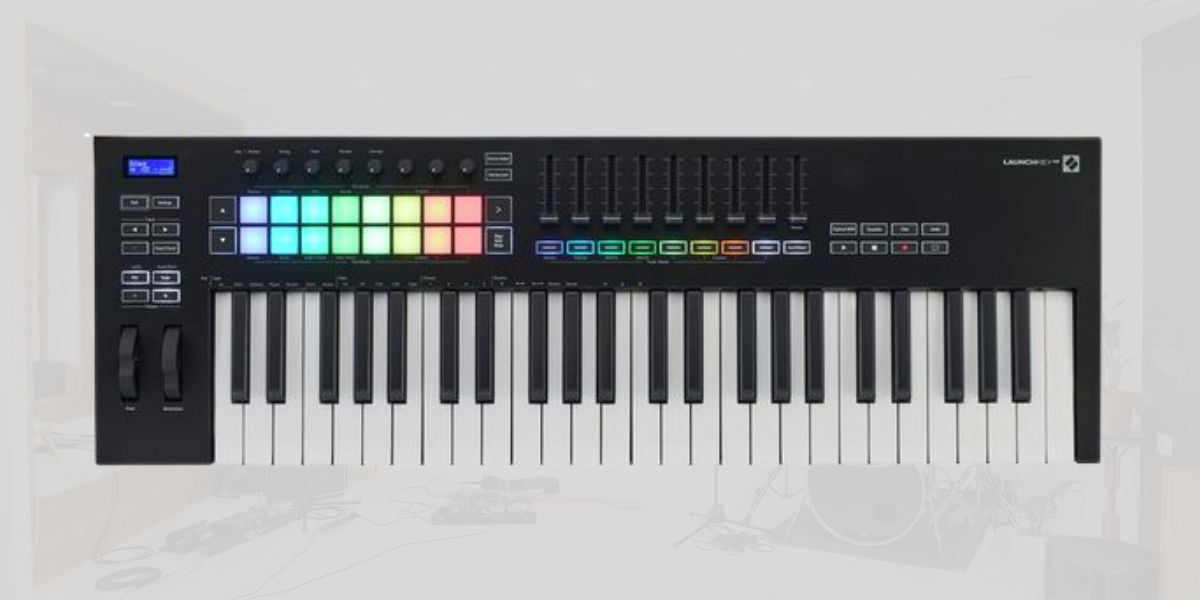
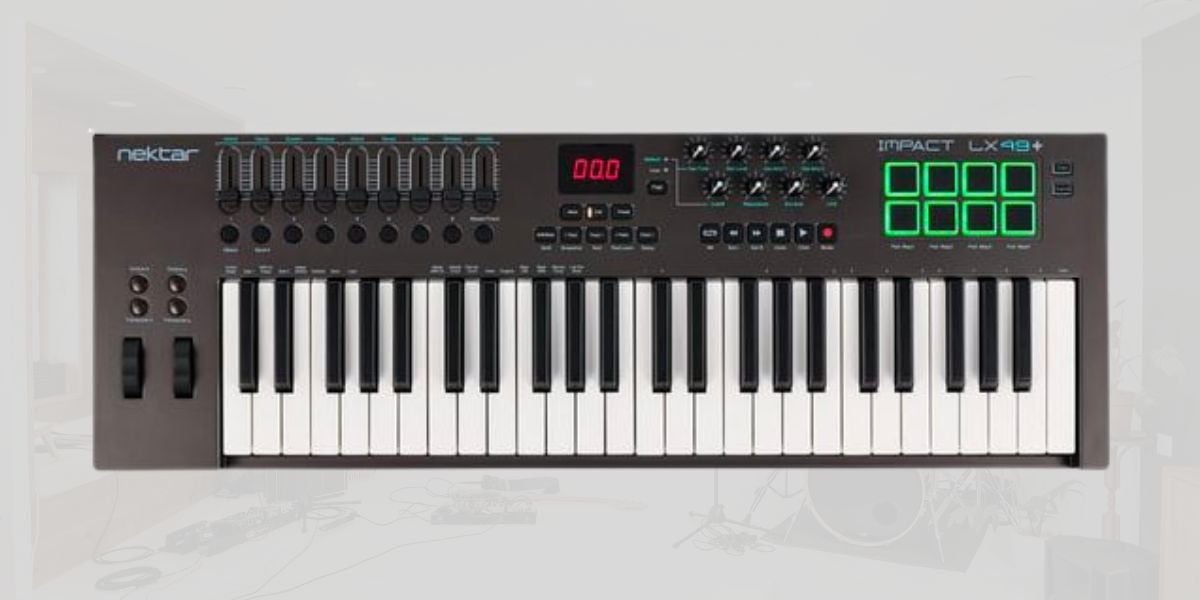
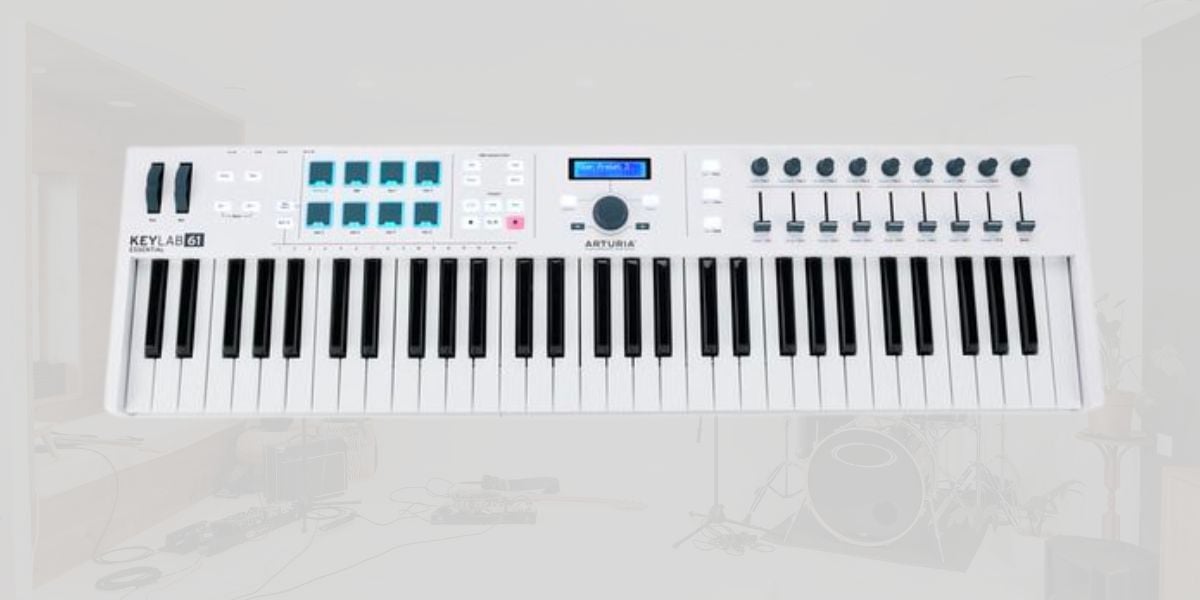
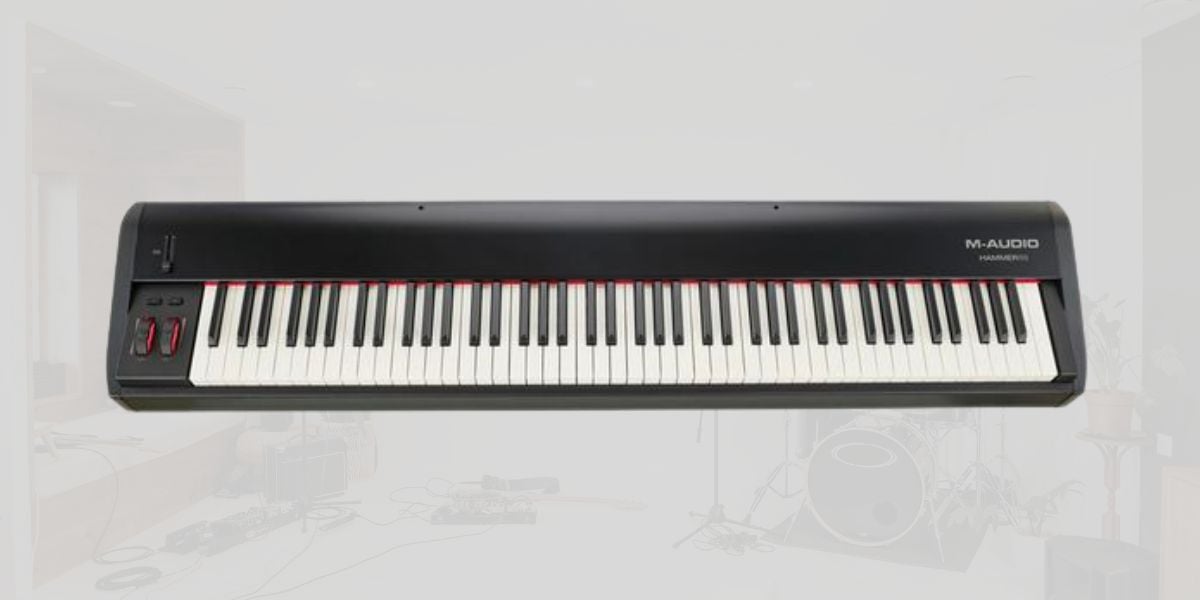
28 Comments
Pavlova
onNo Akai Professional MPK Mini Plus ?? Wow…
Tomislav Zlatic
onWe included AKAI MPK Mini MK3 because it’s the best-selling entry-level MIDI keyboard on the market. But MPK Mini Plus is also interesting. We will consider adding it to the article if it passes our quality test.
Shreepad M Gandhi
onTo start with I used Casio CTK2400, 61-key for my MIDI requirements…
Recently, bought my first controller Arturia’s minilab3…the only shortcoming being 25 keys…at least 37 key instrument is recommended…
Minilab3 is good no doubt but the number of keys does function as a bottleneck.
Wojtek
onJa mam 2 MIDI kontrolery : Arturia MiniLab i Akai MPK Mini Play Professional. Niestety ten drugi nie bardzo mi pasuje że względu na kiepską opcję w postaci joysticka jako pitch. Wolałbym zmienić na inny kontroler od Arturii , na przykład Vocoder. Obydwa kontrolery używam z oprogramowaniem Analog Lab 4 i Analog Lab V. Mam jeszcze wersję starszą AnalogLab. Od czasu do czasu mogę dodać nowe banki dźwięków. Tworzę muzykę Techno i elektroniczną. Za Arturię zapłaciłem kilka lat temu około 500zł Nie używam DAW.
Tianzii
onI gotta say: I love my AKAI MPK Mini Mk3.
It comes out of the box with 3 very nice VSTs: AIR Hybrid 3, Velvet 2 and Mini Grand. It Also comes with MPC DAW, but that’s free anyway, and I’m better by using FL Studio.
Also, Novation throws some good paid VSTs as free for owners of their products via Open Collective. At some point I wanted to get Novation Keys just to get access to Open Collective, to get Massive free and other such VSTs, but I didn’t, yet. :)
Though to let everyone know about these. Maybe someone is interested as well.
ASJ
onUnfortunately the Focusrite/Novation plugin collective has ended: https://focusrite.com/en/news/plug-collective-massive-and-ozone-elements
“Plug-in Collective has now ended. But don’t worry, you can still get premium software to keep you making studio-quality tracks”.
Tomislav Zlatic
onYes, that is unfortunate. The Plugin Collective was great.
Numanoid
onIt is just words, but “reasonably priced” or “budget” sounds a lot better than “cheap” ;-)
Tomislav Zlatic
onYou’re right, cheap can sound a bit negative. I will change it up a bit when I update the article. Budget-friendly studio equipment with the best price-to-quality ratio is what we’re looking for.
Bruno de Souza Lino
on“Reasonably priced” and “cheap” don’t mean the same thing.
Federico
onI’m unfortunately owner of Akai Mpk Mini: two keys broken after a couple of years.
Tomislav Zlatic
onThat’s unfortunate. Did it fall, or did the keys simply malfunction due to regular use?
915Boss
onThese are all name brand controllers which is usually better, but no mention of monoprice, donner, midiplus or ekeys which are much more budget friendly and just as good in many cases.
Tomislav Zlatic
onI tested several ultra-cheap MIDI controllers from smaller brands, and there were always minor quality issues. I remember that the one from MIDIPLUS arrived with a malfunctioning pitch wheel.
I think it’s a bit of a lottery with these brands. If you get a fully working unit, it should be fine, but there’s a possibility that you’ll receive a problem unit (a higher chance than with bigger brands).
Darryl Lim
onI was looking for a cheap & portable midi keyboard this week, my M-Audio Keystation 61es (FROM 2006, WOW) was too big to keep moving around my limited room & desk space.
In my local Asian Malaysian market, i settled upon the MIDIPLUS x3 as the best option for my criteria. More features than the similarly-priced Korg MicroKey2 37, for DAW control, & their pitch & mod wheels have been replaced with touch strips, that also have LED-level-indicators beside each strip (awesome idea, haven’t yet seen this design on any other budget touch-strip controllers). Mine will probably arrive in a week or two, & i’ll report back on how i find it.
Tomislav Zlatic
onCool! I’d really love to know how you like the Midiplus. I’m using the Arturia Keystep as my MIDI keybord right now because it’s so portable, but I’d love to have a few MIDI CC knobs on it.
alex
onI still carry M-Audio Oxygen 8 v2 (released in 2008) in my backpack. You just can’t kill the damn thing :)
Tomislav Zlatic
onExactly, those old M-Audio Oxygens are incredibly durable. I’m not sure what it is, they look like any other MIDI keyboard from the early 2000s, but the build quality is next level, especially for the price.
Adam
onThey were great. I love how easlly they’ve implemented audio interface in ozonic series. You got complete audio system out of a box.
ASJ
onI think it should be mentioned in the article that Arturia Minilab’s latest model now has a MIDI out, so if you want this feature specifically it is a cheaper option compared to the keystep 37 (and comes with more controls for software as well).
A brand missing from this list is Korg, which makes the supersmall NanoKey (Studio) and the decent MicroKey 37. Also the MicroKey Air series is a budget option that has bluetooth implementation
Tomislav Zlatic
onHey ASJ, great suggestions, thank you. I will update the article with this information. I will also include MicroKey (I used it and loved it several years ago) and another entry-level MIDI keyboard.
TImmey
onCan’t recommend the MPK Mini Series,as the build quality is bad. I have a Mini mk2 here with a broken G-Key.The case is bent over time as the material is thin and the Mini mk3 looks like it is using the same case. Search the Internet for “mpk mini broken keys”. There are no chance to get spare parts as Akai itself says “this is a throwaway device,we don’t offer spare parts”.
One Device i miss here is the “Studiologic SL73/88 Studio”. It has an excellent 88-key weighted hammer action Fatar Keybed (the same as in the NI Komplete Kontrol/Arturia Keylab 88), absolutely no “nonsense” keys besides Pitch/mod/x-y and the price is around 380-400€.
Mark
onI have a Korg Microkey-61 which has been dropped quite a few times and still is a reliable, solid piece of gear after many years.
Came bundled with some nice virtual instruments including Korg’s Legacy collection.
A purchase I do not regret.
Sando
onAs a piano player I’d strongly recommend Studiologic SL88 Studio, which is missing in this list.
T
onBig fan of the Arturia MiniLab Mk2 and the KeyLab88 Mk2. The MiniLab is perfect for a backpack grab-and-go setup. I can take it, a pair of Genelec 8010a monitors, a bus powered Steinberg UR44C and my MBP out anywhere that has power and get a lot of stuff done. All with one backpack and one little bag for the monitors. Pretty amazing. I use the KeyLab88 Mk2 as my main keyboard/controller in my home studio and I absolutely love it. The key bed feels right (I compared it to several other makes/models before buying), the integration with all of my DAWs and the Arturia plugin synths is excellent, and there’s enough faders, switches, and knobs (plus the transport section) to access most of the important stuff in plugins or when mixing. It is fairly heavy but is really well made and it has been a good investment. Highly recommended.
Nine
onStrongly recommend that people consider 61 keys the smallest size they should get, unless you need to put it in a backpack. 61 keys allows you the option of playing piano, on top of everything smaller keyboards offer. 25 keys/2 octaves won’t work with a lot of instrument plugins that have articulation options a few octaves down on the left side. Arturia and Native Instruments are good options.
ASJ
onMore than 49 keys is overkill if you can’t play piano IMO, and articulations are stuff for actual piano players, not for people who press one key to trigger an arpeggiator on a monosynth (like I do)
Chib Ofred
onI’m seemingly lost in the jungles of too many tracks in getting the right musical instruments that do the job better than others. I observed playing just the acoustic guitar, performing my songs, rehearsing them over time, enables me arrange bass lines, improving percussion, string and brass sessions with my mouth.
I’m setting up small home studio, bought Scarlett 2i2 studio package, hopefully to upgrade my laptop with budget midi keyboard and monitors, treat my room. My headaches has been ever-changing technology in sounds production each day. Millions of amateur musicians worldwide like me struggling to get one big hit. The truth is too many instructions and directives on how to, aggravating my plight and temptations to buy this and that on offers.
Email me to assist spend saved funds for upgrade, and if you’ve tutorial likewise.